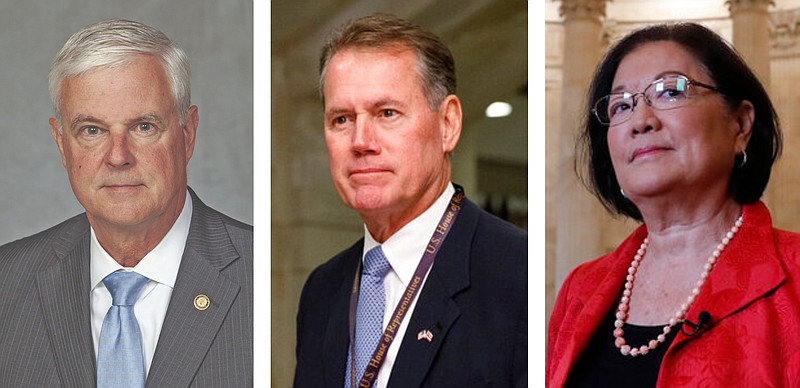Marshall Islanders legally living in the United States would become eligible again for nutrition assistance for their children, among other federal programs, under a bill introduced in Congress on Friday.
Third District Rep. Steve Womack, R-Rogers, joined two Hawaiian members of Congress in sponsoring the bill.
U.S. Census estimates show Arkansas as home to 15,000 Marshallese, most of them in Northwest Arkansas. They comprise the largest concentration of Marshall Islanders in the continental United States, according to U.S. Census Bureau estimates.
Marshallese and other Pacific Islanders from former U.S. territories may live in the United States without a visa and with access to certain public benefits. Entitlement to most of those benefits was inadvertently taken away with a welfare reform act that passed in 1996, Womack said Friday.
The number of resident Pacific Islanders in the United States has grown over the last 25 years, making their omission from benefits more hurtful each passing year, according to Womack.
"Marshallese families are an integral part of Arkansas," he said. These residents "support U.S. defense efforts, pay taxes and are core elements of our economy and communities," he said. Their home countries are also vital to U.S. defense, he said.
Womack, Rep. Ed Case, D-Hawaii, and Sen. Mazie K. Hirono, D-Hawaii, sponsored the bill, which hasn't yet been assigned to a congressional committee. The bill would restore benefits for Marshall Islanders and for citizens of Federated States of Micronesia and the Republic of Palau.
Benefit programs involved include: the Supplemental Nutrition Assistance Program, or SNAP, for children; Temporary Assistance for Needy Families; Supplemental Security Income; Social Services block grants; education assistance; and FEMA Disaster Assistance grants.
The cost if benefits are restored isn't calculated yet, according to a spokesman for Womack.
The bill's introduction drew praise from local leaders, whose comments were included in Womack's announcement.
"Springdale, Arkansas is privileged to be called home by several thousand Marshallese residents. Their positive impact and contribution to our community is immeasurable," said Mayor Doug Sprouse. "In turn, we believe they are deserving of the same access to benefits as all other lawful residents. As mayor, I wholeheartedly support and urge passage of the Compact Impact Fairness Act."
The compact Sprouse referred to is the Compact of Free Association with the Republic of the Marshall Islands. This and other compacts are treaties allowing citizens of the Pacific Island nations mentioned in the bill to travel freely to the United States.
This bill will ensure the compact communities are protected, said Melisa Laelan, executive director of the Springdale-based Arkansas Coalition of the Marshallese.
"It will fix injustices that we have faced over a 25-year period. We applaud the work that Rep. Steve Womack has done to ensure COFA receives fairness and equitable access to programs that we pay into. This is another chance to better lives to many COFA migrants," Laelan said.
Bill Rogers, president of the Springdale Chamber of Commerce, also praised the bill.
"The Marshallese are significant contributors to our economy and to the fabric of our culturally diverse city," he said. "We applaud the efforts of Congressmen Womack and Case to advance these protections."
Gerald Zackios, ambassador of the Republic of the Marshall Islands to the United States, thanked Womack in particular for efforts on behalf of the Islanders.
Case said compact nations' citizens were unfairly excluded from benefits open to any other legal resident.
"It is fundamentally unfair for our federal government to ignore its obligations under the Compact of Free Association that are national in interest and scope and then impose the responsibility for providing basic services to citizens on state and territorial governments," Case said.
The burden of providing basic services fell to states because of the federal benefits lapse, he said.
Hirono noted many compact citizens serve in the U.S. Armed Forces while others are front-line health care workers who helped the nation through the ongoing covid-10 pandemic.
"This important legislation builds off the success of restoring Medicaid eligibility for COFA citizens last year, upholds the promises we made to our critical national security partners in the Freely Associated States, and assists states like Hawaii that have traditionally worked without a federal partner in supporting this community," Hirono said.
"I am encouraged this legislation enjoys bipartisan support, and I will continue working with my colleagues in both parties to build support to pass it."
The latest available federal estimate, from 2020, calculated that about 100,000 citizens of associated states live in the United States or in territories still controlled by the United States such as Guam. They "disproportionately reside in Hawaii, Guam, Washington, Arkansas, Oregon, and California, but also have a sizable presence in Texas, the Northern Mariana Islands, Oklahoma, Arizona, Missouri, Georgia, Colorado, and Iowa," the General Accounting Office found.
More News
Bill tracking
The website congress.gov allows tracking of congressional bills. The bill to restore federal program benefits to Marshallese living in the United States had not yet been posted to the site as of Friday.

